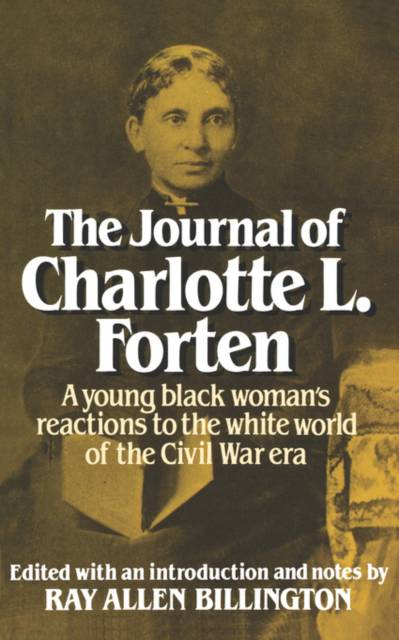
- Afhalen na 1 uur in een winkel met voorraad
- Gratis thuislevering in België vanaf € 30
- Ruim aanbod met 7 miljoen producten
- Afhalen na 1 uur in een winkel met voorraad
- Gratis thuislevering in België vanaf € 30
- Ruim aanbod met 7 miljoen producten
Zoeken
The Journal of Charlotte L. Forten
A Free Negro in the Slave Era
Charlotte L Forten
Paperback | Engels
€ 35,95
+ 71 punten
Omschrijving
Charlotte L. Forten (1838-1914) was sensitive, intelligent, and educated in the culture and conventions of pre-Civil War America. But one thing distinguished her from other young Philadelphia women: she was black, destined to endure the constant insults that were accorded any person of color in her day. Her remarkable diary reveals how her resentment against the prejudice of the white world became transformed into an iron determination to excel. Impatient to help the self-advancement of other blacks, she went to Massachusetts to become a teacher and became active in literary and abolitionist circles. Then, during the Civil War, she traveled to South Carolina to participate in a unique social experiment involving newly freed blacks of the Sea Islands. In 1878 she married the Reverand Francis J. Grimké, the son of Henry Grimké whose two sisters, Sarah and Angelina, were prominent abolitionists. Charlotte Forten's zeal for justice and her personal renderings of the events and people of her day make her journal an important document in American social history. Her bequest to humanity, Ray Allen Billington writes, "was a journal which could reveal to a later generation her undying belief in human decency and equality."
Specificaties
Betrokkenen
- Auteur(s):
- Uitgeverij:
Inhoud
- Aantal bladzijden:
- 288
- Taal:
- Engels
Eigenschappen
- Productcode (EAN):
- 9780393000467
- Verschijningsdatum:
- 1/05/1981
- Uitvoering:
- Paperback
- Formaat:
- Trade paperback (VS)
- Afmetingen:
- 127 mm x 203 mm
- Gewicht:
- 272 g

Alleen bij Standaard Boekhandel
+ 71 punten op je klantenkaart van Standaard Boekhandel
Beoordelingen
We publiceren alleen reviews die voldoen aan de voorwaarden voor reviews. Bekijk onze voorwaarden voor reviews.








